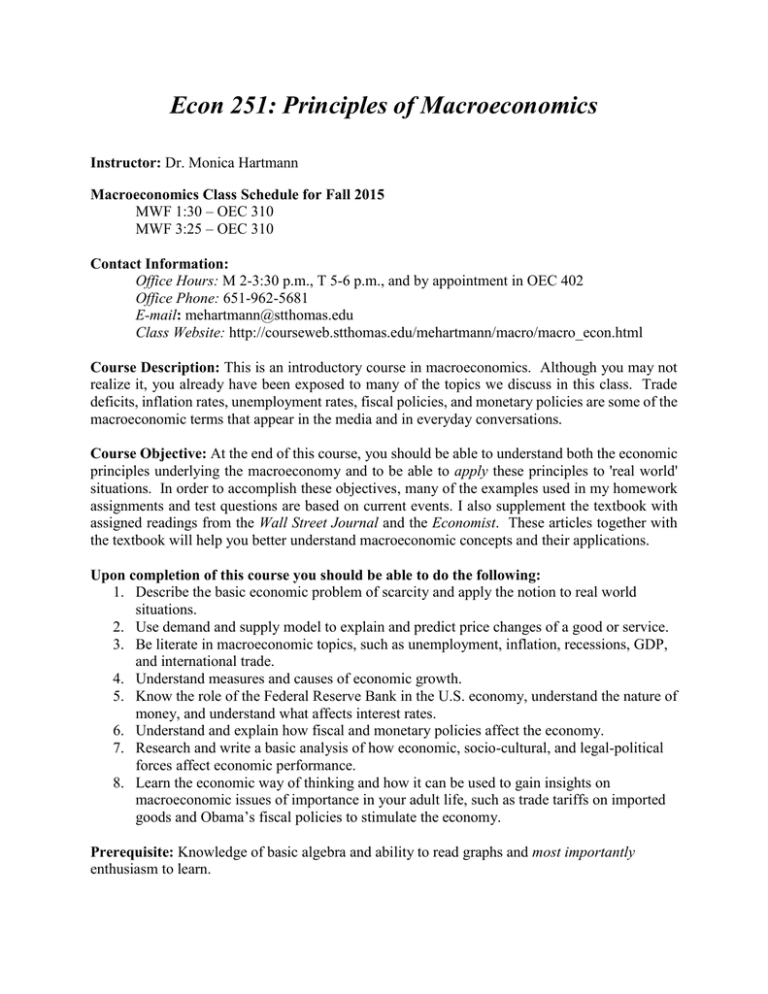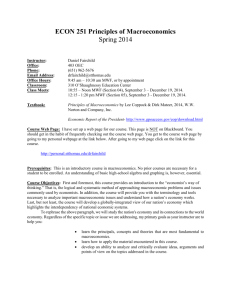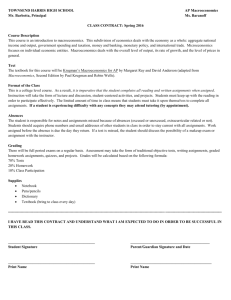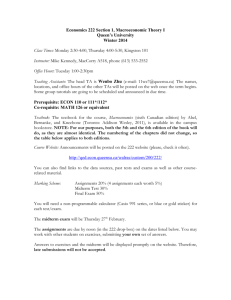Principles of Macroeconomics
advertisement

Econ 251: Principles of Macroeconomics Instructor: Dr. Monica Hartmann Macroeconomics Class Schedule for Fall 2015 MWF 1:30 – OEC 310 MWF 3:25 – OEC 310 Contact Information: Office Hours: M 2-3:30 p.m., T 5-6 p.m., and by appointment in OEC 402 Office Phone: 651-962-5681 E-mail: mehartmann@stthomas.edu Class Website: http://courseweb.stthomas.edu/mehartmann/macro/macro_econ.html Course Description: This is an introductory course in macroeconomics. Although you may not realize it, you already have been exposed to many of the topics we discuss in this class. Trade deficits, inflation rates, unemployment rates, fiscal policies, and monetary policies are some of the macroeconomic terms that appear in the media and in everyday conversations. Course Objective: At the end of this course, you should be able to understand both the economic principles underlying the macroeconomy and to be able to apply these principles to 'real world' situations. In order to accomplish these objectives, many of the examples used in my homework assignments and test questions are based on current events. I also supplement the textbook with assigned readings from the Wall Street Journal and the Economist. These articles together with the textbook will help you better understand macroeconomic concepts and their applications. Upon completion of this course you should be able to do the following: 1. Describe the basic economic problem of scarcity and apply the notion to real world situations. 2. Use demand and supply model to explain and predict price changes of a good or service. 3. Be literate in macroeconomic topics, such as unemployment, inflation, recessions, GDP, and international trade. 4. Understand measures and causes of economic growth. 5. Know the role of the Federal Reserve Bank in the U.S. economy, understand the nature of money, and understand what affects interest rates. 6. Understand and explain how fiscal and monetary policies affect the economy. 7. Research and write a basic analysis of how economic, socio-cultural, and legal-political forces affect economic performance. 8. Learn the economic way of thinking and how it can be used to gain insights on macroeconomic issues of importance in your adult life, such as trade tariffs on imported goods and Obama’s fiscal policies to stimulate the economy. Prerequisite: Knowledge of basic algebra and ability to read graphs and most importantly enthusiasm to learn. Textbook: McEachern, Macroeconomics – UST Bookstore Economic Report of the President – http://www.gpoaccess.gov/eop/download.html In addition to the textbook, I will periodically assign newspaper or journal articles that relate to the topics discussed in class. These supplemental articles are an essential part of this course. A copy of them can be downloaded from the class web page. Class Website: http://courseweb.stthomas.edu/mehartmann/macro/macro_econ.html Assignments, answer keys, and supplemental readings will be posted on this website. Grading: Midterm 1 Midterm 2 Final Writing Assignments Class Participation FOMC Simulation Homework 20% 25% 25% 10% 10% 5% 5% The exams comprise of multiple-choice questions, numerical problems, and short answers. If you have any questions concerning the grading of your work, please come see me. You have two weeks from the date I return homework or exams to the class to ask me to reexamine the grade. After the two weeks, grades are final. Significant progressive improvement in your examination grades may have an additional marginal positive effect on your final grade. Exam Policy: Make up examinations only will be given in the event of a severe illness, death in the family, or a University sponsored activity. You must speak directly to me at least 24 hours prior to the exam. Leaving a message on my voice mail or sending me email is not sufficient. If approved, we will reschedule the exam at a mutually convenient time. If no arrangements have been made prior to the scheduled exam time, no make-up exam will be given without a medical excuse. You will receive a zero for that grade. Also note that possessing a refundable plane/train/bus ticket is not a valid excuse for a make-up exam. Exam dates are listed on the course outline. These dates are subject to change, but I will announce in class any change with at least one-week notice. You are responsible for all information – lecture material, handouts, assignments, and announcements – given in class regardless if you are present. Disability Services: Academic accommodations will be provided for qualified students with documented disabilities including but not limited to mental health diagnoses, learning disabilities, Attention Deficit Disorder, chronic medical conditions, visual, mobility, and hearing disabilities. Students are invited to contact the Disability Resources office about accommodations early in the semester. Appointments can be made by calling 651-962-6315 or in person in Murray Herrick, room 110. For further information, you can locate the Disability Resources office on the web at http://www.stthomas.edu/enhancementprog/. Homework: Homework assignments are designed to give you the opportunity to practice using macroeconomic concepts before the exam. I encourage you to work on homework assignments with other students. However, you must individually write up separate answers in your own words. You can drop the lowest homework grade. I view homework as part of the learning process, a first attempt to process ideas and to apply them to real world events. Therefore, the economic analysis for your homework assignments does not have to be completely correct to get a 100%. However, your assignments must be legible, neat, and demonstrate that effort was made in its completion. Homework points are assigned as follows: Assignment is complete (but not necessarily 100% correct), legible, neat, and presented in a professional manner. (grade = 100%) - Assignment submitted, but there is insufficient effort. It is either incomplete, sloppy, unclear, or inadequate effort displayed in answering the questions. (grade = 70%) Zero Assignments that are illegible and/or so poorly attempted are not acceptable and will not be given any credit. (grade = 0%) Class Participation: Your class participation grade will be a combination of my analysis of your attendance, preparation for class, contribution to class discussions, and completion of any in-class assignments. Why is class participation important? First of all, participation enables students to learn from each other. As intelligent individuals with diverse academic and personal backgrounds, you bring different perspectives on an issue. Through an exchange of ideas we can all learn more. Second, studies show that students who are actively involved in learning are more likely to remember and to assimilate the material and to apply concepts learned in the classroom to other situations. FOMC Simulation: The Federal Open Market Committee (FOMC) meets in Washington, D.C. once every five or six weeks to vote on whether or not interest rates need to be adjusted to spur or slow down economic growth in the U.S. The class will simulate a FOMC meeting. More details on this assignment will be given in the future. Writing Assignment: During the course of the semester, you will be asked to perform economic analysis, sometimes individually and sometimes as a group. More information will be provided throughout the semester. Office Hours: Prior to exams and homework due dates I will schedule extra office hours. Please come see me if you are having trouble with the course material or need to clarify some concepts. Office hours are time I have set aside for you. Office hours, however, will not be used to obtain tutorial help for classes that were skipped. You are expected to get the notes from your classmates and read them first and then you can ask me questions about the material that is unclear to you. Also please take advantage of the time before and after class to ask questions or to clarify what was discussed in lecture. Economic tutoring is also available in OEC 415. When the tutoring schedule is announced, I will post it on the class web page. Studying: The best way to learn, to understand, and to progress beyond memorization, is to study with your classmates. Do not be shy; introduce yourself to a classmate and study together. You will not understand economics unless you can explain it clearly and correctly by accepted standards in economics. So, take turns asking and answering questions of one another. If your study group is uncertain about any topic, see the tutors and/or me. Please NOTE that studying together does not replace individual study; it only complements it. WSJ Subscription: I recommend getting a subscription to the Wall Street Journal. You should get in the habit of reading news sources and identifying the macroeconomic issues underlying current news events. Seeing the applications to 'real world' situations will help you grasp the economic theory. Course Outline: I. II. III. IV. V. Introduction to Economics and Review, Chapters 1, 2, and 4 Introduction of Macroeconomics, Chapter 5 Productivity & Growth, Chapter 8 Unemployment and Inflation, Chapter 7 Tracking the U.S. Economy, Chapter 6 First Exam – October 15th VI. VII. VIII. IX. Aggregate Demand, Chapters 9 and 10 Aggregate Supply, Chapter 11 Fiscal Policy, Chapter 12 Federal Budgets and Public Policy, Chapter 13 Second Exam – November 17th X. XI. XII. Monetary Policy, Chapters 14, 15, and 16 Macro Policy Debate, Chapter 17 International Finance, Chapter 19 Final Examination – Tuesday, December 17th at 1:30 p.m. (1:30 class) Tuesday, December 22nd at 10:30 a.m. (3:25 class)





